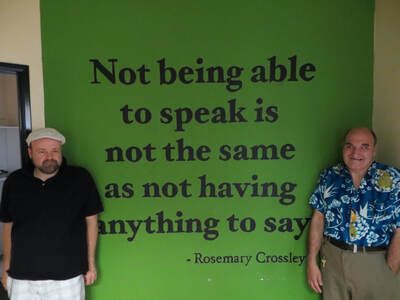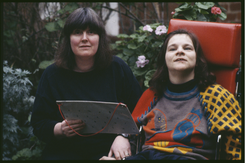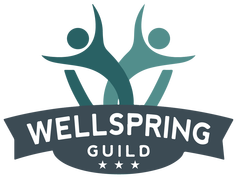 Tracy Thresher and Larry Bissonnette
Tracy Thresher and Larry Bissonnette
I am very sad to hear that Rosemary Crossley passed away it’s hard to imagine the world without her sense of humor and relentless work to support non-speaking people. I would not be the person I am today if Rosemary didn’t discover supported typing. We will miss you Rosie and thank you for all that you did.
Tracy Thresher
It is hard to put into words how much Rosie has impacted the world of disability here in the United States. She has been our beginning, both showing us the possibility and nurturing our way forward. Always ready to advance the voice of those without speech, Rosie has been both tireless and fearless. We will miss her wisdom, her humor and her strength.
Marilyn Chadwick
My first introduction to Rosemary Crossley’s work happened in early 1991... Reading that article and learning about Rosemary’s work had a profound impact on the direction my work journey would take from that moment on... Rosemary probably had the most expansive toolbox of anyone that I have ever met in the field of communication.
Pascal Cheng (Pascal's full comments are below the press release)
Tracy Thresher
It is hard to put into words how much Rosie has impacted the world of disability here in the United States. She has been our beginning, both showing us the possibility and nurturing our way forward. Always ready to advance the voice of those without speech, Rosie has been both tireless and fearless. We will miss her wisdom, her humor and her strength.
Marilyn Chadwick
My first introduction to Rosemary Crossley’s work happened in early 1991... Reading that article and learning about Rosemary’s work had a profound impact on the direction my work journey would take from that moment on... Rosemary probably had the most expansive toolbox of anyone that I have ever met in the field of communication.
Pascal Cheng (Pascal's full comments are below the press release)

PRESS RELEASE: Rosemary Crossley has died
UPDATED: Friday 12th of May 2023
It is with great sadness and a heavy heart that the Anne McDonald Centre Committee of Management announce the death yesterday of its Director and co-founder, Rosemary Crossley.
Dr. Rosemary Crossley, AM, PhD, died on 10/5/2023. She was 78 years old. She became famous as a therapist with and advocate for people with little or no functional speech.
Crossley was born on 6/5/1945 at Horsham. She was educated at Morongo school and went on to the Australian National University. After a brief period in the Australian Public Service she began working at the Victorian Spastic Centre with people with severe handicaps.
In 1974 she was hired as a playleader at St. Nicholas Hospital, a Parkville institution for severely handicapped children run by the Victorian Health Commission. It was there that she met Anne McDonald. McDonald had severe cerebral palsy, could not walk, talk, or feed herself, and had been diagnosed as severely retarded.
Crossley decided to see if she could find a way for McDonald to communicate by pointing – first at choices on a communication board, then at word blocks, then letter blocks, and finally on a letter board.
This brought Crossley into conflict with her superiors at the hospital, and eventually McDonald asked to leave. The Health Commission refused to allow this, and were taken to the Victorian Supreme Court on a very rare habeas corpus action. Anne won the action, and left St. Nicholas to live with Crossley and her partner Chris Borthwick for the next thirty-two years.
“Annie’s Coming Out”, Crossley and McDonald’s account of their struggle, was an international bestseller and went on many school curriculums. It was later made into a movie of the same name, which won the AFI Best Picture award in 1984.
The court case, the book, and the film exposed the shortcomings of St. Nicholas Hospital and of the system that had created it, and led directly to the closure of the hospital a few years later – the first step in the deinstitutionalisation of care for people with disabilities in Victoria.
In 1986 Crossley founded the DEAL Communication Centre in Caulfield. The Centre began by working mainly with people with cerebral palsy, but soon found itself taking on clients with other diagnoses – Down Syndrome, Rett Syndrome, developmental disabilities, and, increasingly, autism. In case after case Crossley was able to establish a means of communication with the client, demonstrating that their diagnoses of intellectual disability had been made in error.
Crossley described her methods as Facilitated Communication Training, involving coactive hand-on-hand movement at the beginning of the training process. While she always aimed for eventual independent communication, the method was criticised for allowing communicators to impose their messages on their partners.
Nonetheless, many people who Crossley had helped communicate went on to graduate from schools and universities.
When Anne McDonald died in 2010 DEAL changed its name to the Anne McDonald Centre, but the work went on. iPads, in particular, have spread hand-pointing skills more widely, and newer clients were better able to communicate more independently sooner.
Crossley wrote books (including “Speechless”, 1997) lectured at universities and presented papers at conferences around the world. She was awarded an AM in 1986 for services to people with severe communication impairments and took a doctorate in communication from Victoria University in 1998. She was admired for her indomitable spirit, her determination, and her ability to empower others in advocating for themselves and for the people they loved.
Dr. Crossley died of cancer in the Royal Melbourne Hospital on 10/5/2023. She was working till the end: in the hospital, she was able to assist a nurse who had a foster son with communication handicap with books, boards, and iPad apps.
Together, Crossley and McDonald changed the history of disability. Crossley’s life work of teaching, researching, and advocating for people with little or no functional speech has improved the lives of thousands of the most vulnerable people in many countries and over five decades. Her sharp intellect and wicked good humour will be missed. The world has lost an important voice speaking out for the rights of people with disabilities.
This article came from: PRESS RELEASE: Rosemary Crossley has died – Media Database (getthewordout.com.au)
UPDATED: Friday 12th of May 2023
It is with great sadness and a heavy heart that the Anne McDonald Centre Committee of Management announce the death yesterday of its Director and co-founder, Rosemary Crossley.
Dr. Rosemary Crossley, AM, PhD, died on 10/5/2023. She was 78 years old. She became famous as a therapist with and advocate for people with little or no functional speech.
Crossley was born on 6/5/1945 at Horsham. She was educated at Morongo school and went on to the Australian National University. After a brief period in the Australian Public Service she began working at the Victorian Spastic Centre with people with severe handicaps.
In 1974 she was hired as a playleader at St. Nicholas Hospital, a Parkville institution for severely handicapped children run by the Victorian Health Commission. It was there that she met Anne McDonald. McDonald had severe cerebral palsy, could not walk, talk, or feed herself, and had been diagnosed as severely retarded.
Crossley decided to see if she could find a way for McDonald to communicate by pointing – first at choices on a communication board, then at word blocks, then letter blocks, and finally on a letter board.
This brought Crossley into conflict with her superiors at the hospital, and eventually McDonald asked to leave. The Health Commission refused to allow this, and were taken to the Victorian Supreme Court on a very rare habeas corpus action. Anne won the action, and left St. Nicholas to live with Crossley and her partner Chris Borthwick for the next thirty-two years.
“Annie’s Coming Out”, Crossley and McDonald’s account of their struggle, was an international bestseller and went on many school curriculums. It was later made into a movie of the same name, which won the AFI Best Picture award in 1984.
The court case, the book, and the film exposed the shortcomings of St. Nicholas Hospital and of the system that had created it, and led directly to the closure of the hospital a few years later – the first step in the deinstitutionalisation of care for people with disabilities in Victoria.
In 1986 Crossley founded the DEAL Communication Centre in Caulfield. The Centre began by working mainly with people with cerebral palsy, but soon found itself taking on clients with other diagnoses – Down Syndrome, Rett Syndrome, developmental disabilities, and, increasingly, autism. In case after case Crossley was able to establish a means of communication with the client, demonstrating that their diagnoses of intellectual disability had been made in error.
Crossley described her methods as Facilitated Communication Training, involving coactive hand-on-hand movement at the beginning of the training process. While she always aimed for eventual independent communication, the method was criticised for allowing communicators to impose their messages on their partners.
Nonetheless, many people who Crossley had helped communicate went on to graduate from schools and universities.
When Anne McDonald died in 2010 DEAL changed its name to the Anne McDonald Centre, but the work went on. iPads, in particular, have spread hand-pointing skills more widely, and newer clients were better able to communicate more independently sooner.
Crossley wrote books (including “Speechless”, 1997) lectured at universities and presented papers at conferences around the world. She was awarded an AM in 1986 for services to people with severe communication impairments and took a doctorate in communication from Victoria University in 1998. She was admired for her indomitable spirit, her determination, and her ability to empower others in advocating for themselves and for the people they loved.
Dr. Crossley died of cancer in the Royal Melbourne Hospital on 10/5/2023. She was working till the end: in the hospital, she was able to assist a nurse who had a foster son with communication handicap with books, boards, and iPad apps.
Together, Crossley and McDonald changed the history of disability. Crossley’s life work of teaching, researching, and advocating for people with little or no functional speech has improved the lives of thousands of the most vulnerable people in many countries and over five decades. Her sharp intellect and wicked good humour will be missed. The world has lost an important voice speaking out for the rights of people with disabilities.
This article came from: PRESS RELEASE: Rosemary Crossley has died – Media Database (getthewordout.com.au)
More comments about Rosemary Crossley from Wellspring Guild Trainers
Full statement from Pascal Cheng:
My first introduction to Rosemary Crossley’s work happened in early 1991 when a friend handed me an article written by Professor Doug Biklen from Syracuse University and published in the August 1990 issue of the Harvard Educational Review journal. The article was entitled “Communication Unbound: Autism and Praxis” and described the work that Rosemary Crossley was doing with a new method of communication called facilitated communication with non-speaking individuals at her communication center in Melbourne, Australia. Reading that article and learning about Rosemary’s work had a profound impact on the direction my work journey would take from that moment on. Over the years, I had the opportunity to hear Rosemary speak at different conferences and observe her working with different people. In our Wellspring Guild training programs for coaches and trainers in FC, we talk about having a “toolbox” of resources, written materials, and equipment to use when doing training and coaching. Rosemary probably had the most expansive toolbox of anyone that I have ever met in the field of communication. And this was a toolbox of not just low tech and high-tech
communication boards and devices, but also a wealth of knowledge built upon many years of experience working with a variety of communicators. And she carried this “toolbox” with an incredible spirit and belief that anyone could learn to communicate with
the right support.
Full statement from Pascal Cheng:
My first introduction to Rosemary Crossley’s work happened in early 1991 when a friend handed me an article written by Professor Doug Biklen from Syracuse University and published in the August 1990 issue of the Harvard Educational Review journal. The article was entitled “Communication Unbound: Autism and Praxis” and described the work that Rosemary Crossley was doing with a new method of communication called facilitated communication with non-speaking individuals at her communication center in Melbourne, Australia. Reading that article and learning about Rosemary’s work had a profound impact on the direction my work journey would take from that moment on. Over the years, I had the opportunity to hear Rosemary speak at different conferences and observe her working with different people. In our Wellspring Guild training programs for coaches and trainers in FC, we talk about having a “toolbox” of resources, written materials, and equipment to use when doing training and coaching. Rosemary probably had the most expansive toolbox of anyone that I have ever met in the field of communication. And this was a toolbox of not just low tech and high-tech
communication boards and devices, but also a wealth of knowledge built upon many years of experience working with a variety of communicators. And she carried this “toolbox” with an incredible spirit and belief that anyone could learn to communicate with
the right support.

